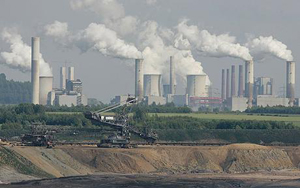Just build it! A necessary kick-start to energy infrastructure from Brussels
on
A necessary kick-start to energy infrastructure from Brussels
Just build it!
The European Commission, accused of timidity and irrelevance in the eurozone crisis, has launched bold proposals to involve the European Union, for the first time, in streamlining national planning approval of vital energy infrastructure and in financing it. Brussels finally seems to have lost its market innocence.
 |
| In the UK 12 Gigawatts of generation is to close by 2016 (photo: telegraph.co.uk) |
More important, the Commission has, rightly in my view, realised that an impulse at the EU level is needed to kick-start implementation of the 2020 energy and climate goals, even though reaching these goals will depend overwhelmingly on the efforts of national companies, regulators and governments. The new initiatives, which I comment on in more detail in my recent paper, "Expanding the European dimension in energy policy", may be seen as an acknowledgement by the Commission that market forces by themselves will not lay the foundations of low carbon energy on time.
There is a parallel. Just as it once appeared to track Britain in energy liberalisation, the Commission’s new interventionism is, to some extent, now following the energy policy U-turn already made by UK politicians of all persuasions. In his 2009 report on UK energy security, Malcolm Wicks, energy minister under Labour, wrote: “the time for market innocence is over….the state must become more active – interventionist where necessary”. Now, the Conservative-Liberal Democrat coalition government proposes multiple forms of intervention and subsidy in the UK electricity market in order to get the necessary power infrastructure and generation built.
The time for market innocence is now also over in Brussels. The Commission has apparently gone through the same learning process as the UK. Over a dozen years, the Commission pushed through
| It is clear that while this legislation may be necessary, it is certainly not sufficient to produce an integrated and fully-equipped energy market |
Rising euro-scepticism
The proposed regulation (Proposal for a regulation on guidelines for trans-European energy infrastructure) sets out criteria to select priority ‘projects of common interest’ (PCIs). They would get streamlined planning treatment. Member states would have to set up a ‘one-stop shop’ authority to make permitting decisions, or at least coordinate all decisions, on these projects, and limit the permitting process to three years, compared to the current EU average of six years for planning inquiries.
The regulation also, very usefully, re-casts environmental impact assessments to give more weight to climate change benefits of infrastructure, such as highly visible pylons carrying power from highly
| Project finance only works for separable projects that creditors can take security over, not for integrated grids |
This is all new political ground for EU involvement. But it may be fertile. Of course the permitting part of the new draft regulation risks straining subsidiarity by encroaching on the politically sensitive area of national planning procedures, at a time of rising euro-scepticism. But in the first reactions of member states to the proposal, only Britain, and to a lesser degree France, complained that it breached subsidiarity. However, the UK appeared to indicate its objection was more in theory than in practice. Significantly too, Germany is backing the proposal. After years of fighting Commission energy network proposals, Germany now sees the need for European grid integration to help it build its post-nuclear future. On this issue at least, Berlin is at last aligned with Brussels.
No miracle
On financing, the Commission proposes some financial engineering to use EU budget funds to lever more private sector finance into infrastructure projects. The PCIs would also get access to money from the new infrastructure fund that the Commission has proposed as part of its new 2014-2020 EU budget
| It is high time to start laying out some money if we are to successfully cross over to a low carbon economy |
These initiatives will work no miracle. For one thing, project finance only works for separable projects that creditors can take security over, not for integrated grids. Yet the current impossibility for state-owned energy transmission companies in eastern Europe to obtain more money from their cash-strapped government owners, and the present difficulty for many private sector energy companies in western Europe to borrow more from Basel-squeezed banks, argues for some EU financial assistance.
Moreover, it is high time to start laying out some money if we are to successfully cross over to a low carbon economy. No country illustrates the problem better than Britain. The UK has dithered so long that its investment needs have, according to the Ofgem regulator, built up to £200bn over the next decade. Much of this is to replace 12 Gigawatts of generation that is to close by 2016 because it does not meet EU de-sulphurisation standards, and another 7.4GW in ageing nuclear capacity due to close by 2020.
Where is the replacement for this to come from? Some renewable capacity is being built and a sizeable amount of new gas capacity has planning permission. But the timetable for new nuclear keeps slipping, while the prospect of clean coal with carbon capture and storage is simply evaporating. You would imagine that as a precaution the UK would already be asking for derogation or delay on that 12GW closure by 2016, but in fact it hesitates out of uncertainty as to how the derogation would fit in with its electricity market reform. In these circumstances, the UK has more reason than most to endorse the Commission’s attempt to give an impulse to laying the foundations for a cleaner and more secure energy system.
|
At the OIES he has specialised in European Union energy and climate policy, publishing a book Energy and Climate Change: Europe at the Crossroads, in 2009, and a paper on Eastern Europe's energy and climate challenges in 2010. He has written a paper on California's energy and climate policies, a study of single state action within a federation and of relevance to the EU. He wrote From Liberalisation to Intervention: Europe, the UK and the Changing Agenda in Ian Rutledge and Philip Wright (eds.),UK Energy Policy and the End of Market Fundamentalism, Oxford University Press, 2011. He also wrote the energy chapter in Policy-making in the European Union, published by OUP in 2010, and the Rough Guide to the Energy Crisis published by Penguin in 2010. His latest paper on the Commission's new energy infrastructure proposal, on which this article is based, is called "Expanding the European Dimension in Energy Policy", and can be found here. |



Discussion (0 comments)